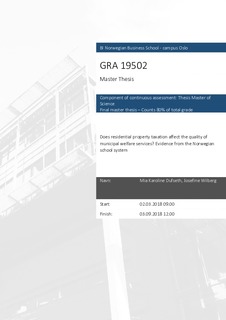Does residential property taxation affect the quality of municipal welfare services? Evidence from the Norwegian school system
Master thesis
Permanent lenke
http://hdl.handle.net/11250/2578917Utgivelsesdato
2018Metadata
Vis full innførselSamlinger
- Master of Science [1621]
Sammendrag
This master thesis explores the incentive effect of residential property taxation on
the quality of welfare services provided by the Norwegian municipalities, where
the quality of welfare services are measured by school results. Norway is a wellsuited
case to investigate this effect, as it is possible to compare municipalities with
and without residential property taxation. We build our analysis on the theoretical
framework of Brennan and Buchanan (1978), Glaeser (1996) and Hoxby (1999),
and follow the empirical method of Fiva and Rønning (2008). We use a two stage
least squares approach in order to estimate the causal effect of residential property
taxation on school results. In contrast to the findings in previous studies, our main
results suggest that there are no effect of residential property taxation on school
results. This implies that the findings of Fiva and Rønning (2008) are not robust to
a number of factors that is implemented in the analysis of this master thesis. The
underlying hypothesis of the analysis is that when residential property tax is levied,
the inhabitants will demand more from their elected local representatives in the
form of a higher voter participation rate. Hence, the representatives have an
incentive to improve the quality of the welfare services provided in their
municipality. Thus, we perform a supplementary analysis that investigate this
relationship. Our findings suggest that there are no effect of residential property
taxation on the voter participation rate in the local election. We find that these
results adds to the robustness of our main findings, that residential property taxation
does not affect school results in Norway.
Beskrivelse
Masteroppgave(MSc) in Master of Science in Business, Economics - Handelshøyskolen BI, 2018
